BEIRUT (AP) — The leader of Lebanon’s Hezbollah group warned Saturday that if Israel’s attacks on Lebanon continue and the Lebanese state does not act to stop them, the group will eventually resort to other alternatives.
Naim Kassem’s comments came a day after Israel launched an attack on Lebanon’s capital for the first time since a ceasefire ended the latest Israel-Hezbollah war in November. The strike on Beirut came hours after two rockets were fired from Lebanon toward Israel and Hezbollah denied it fired them.
There was no immediate response from Israeli officials.
Kassem was supposed to give his speech on Friday to mark Jerusalem Day that is usually held on the last Friday of the Muslim holy month of Ramadan. However, it was postponed because of the Israeli airstrikes on different parts of Lebanon including a suburb of the capital. Jerusalem Day is an annual international day launched by Iran’s first supreme leader Ayatollah Ruhollah Khomeini in 1979 in which Iranians and many of their allies show support for the Palestinians.
Under the U.S.-brokered ceasefire that end the 14-month Israel-Hezbollah war, Israeli forces were supposed to withdraw from all Lebanese territory by late January while Hezbollah had to end its armed presence south of the Litani river along the border with Israel.
The deadline was extended to Feb. 18, but Israel has remained in five border locations while carrying out dozens of strikes on what it said were Hezbollah targets in southern and eastern Lebanon. Last week, Israeli airstrikes on several locations in Lebanon killed six people while an airstrike on a southern village on Friday killed three and wounded 18, most of them women and children.
“We fully complied and we have no presence south of the Litani but Israel did not abide. Israel is carrying aggressions every day,” Kassem said in his televised speech Saturday night.
“These (Israeli strikes) are not violations. They are an aggression that crossed all limits,” Kassem added. He said Israel appears to be pressuring Lebanon to normalize relations with it, a move the Hezbollah totally rejects.
“Israel will not get during peace time what it was not able to achieve by war,” he said. “Let everyone know that this resistance (Hezbollah) is present and ready and at the same time is committed to the agreement.”
But Kassem warned that if Israel does not abide by the deal and the Lebanese state is not able to impose the implementation of the deal through political means, then “we will have to resort to other alternatives.” It was an apparent reference that Hezbollah might resort to its weapons to fight Israeli troops inside Lebanon.
“We will not allow anyone to deprive us from using our force and capabilities to confront this enemy,” said Kassem. He added that Hezbollah “is not weak in facing the projects of America and Israel.”
“Our patience so far aims to give a chance to solutions that could reduce the pains and casualties,” Kassem said.
Hezbollah began launching rockets, drones and missiles into Israel the day after the Oct. 7, 2023, attack on southern Israel by its Hamas allies ignited the war in Gaza. Palestinian militants killed about 1,200 in Israel and abducted 251 others during the 2023 attack.
The Israel-Hezbollah conflict exploded into all-out war last September when Israel carried out waves of airstrikes and killed most of the militant group’s senior leaders. The fighting killed over 4,000 people in Lebanon and displaced about 60,000 Israelis.

Firefighters work at the site hit by an Israeli airstrike in Dahiyeh, a southern suburb of Beirut, Lebanon, Friday, March 28, 2025. (AP Photo/Hussein Malla)

A man walks next to a destroyed car and damaged buildings at the site that was hit by an Israeli airstrike in Dahiyeh, in the southern suburb of Beirut, Lebanon, Friday March 28, 2025.(AP Photo/Hussein Malla)
SAN QUENTIN, Calif. (AP) — Hugs, tears, barking and tail wagging abounded at San Quentin’s prison when two black Labradors reunited with the incarcerated men who helped raise them to be service dogs.
The emotional reunion brought together Chase Benoit, Jared Hansen and the 2-year-old dogs they helped train: Wendel and Artemis. It was the men's first time seeing their former canine companions again and their first time meeting the dogs' disabled handlers in person.
The encounter Friday in San Quentin’s main courtyard brought Benoit and Hansen full circle after helping launch the prison’s puppy training program in April 2023.
“Being in this program, it’s given me something that I think I’ve searched for my whole life,” said Benoit, who is serving 15 years-to-life for second-degree murder. “And that was meaningful purpose, doing something that’s good, better, bigger than myself and feeling like I’m part of something great.”
Robert Quigley, who is deaf, teared up after seeing his spirited dog Wendel bark and get excited when he saw Benoit, his old trainer.
“He remembers me, for sure, I could tell when he came in. I’m so happy that you love him, and that you have a bond,” Benoit told Quigley through an American Sign Language interpreter.
“He’s with me 24/7. He’s very gentle and good with people,” answered Quigley, a recent college graduate who took Wendel home in November after the black Labrador and golden retriever mix completed another six months of professional training outside prison.
Benoit and Jensen were part of an initial group of four incarcerated trainers who shared their 4 foot-by-10 foot cells with the 4-month-old puppies. The men divided the responsibility of caring for and teaching the dogs foundational commands for a year.
Canine Companions, a nonprofit based in Santa Rosa, runs the program and provides free service dogs to people with disabilities. It has built the San Quentin program to 16 trainers and two dog sitters who, as of this week, are training eight puppies.
Artemis, a black Labrador, was matched with Benjamin Carter, a veterinarian from Portland, Oregon, who uses a wheelchair, and traveled to California for the reunion.
Like proud parents, Carter and Hansen shared notes on Artemis' calm and loving personality and penchant for cuddles.
“Seeing him in action and actually serving somebody in the community, it’s just … I’m at a loss for words right now. It’s amazing!” said Hansen, who has been in prison for 15 years for bank robbery.
Artemis, or Artie, pushes door plates, pulls doors open, fetches things around the house and does many other tasks that would be hard for Carter alone.
“He is responsive when he’s working. He is cuddly when he is off the clock. He’s an amazing companion. And all that structure and love and trust was built from these guys here, so I’m just super grateful to them,” Carter said.
The puppies are placed with incarcerated trainers when the dogs are between 2 and 4 months of age and stay with them until they are about 16 to 17 months old. Every three months the puppies are taken out for socialization experiences like interacting with children, riding in cars or going to the grocery store.
The incarcerated men teach them about 20 skills, including fetching, sitting and walking on a leash. After the dogs leave the prison, they train for several more months with professional trainers.
People incarcerated at San Quentin and who participate in the program have been convicted of crimes that include bank robberies, gun offenses and murder. Only those who are in an “earned living unit,” where residents participate in an array of self-help programs, are allowed to apply for puppy training. Inmates with records that include any animal or child cruelty crimes are not allowed to participate, said James Dern, national director of puppy programs for Canine Companions.
Dern said dogs trained in their prison programs have a 10% greater success rate at becoming service dogs than other candidates because of the amount of time and care that incarcerated puppy raisers put into their dogs.
“Being given something to care about other than themselves and the opportunity to give back and to sort of start to make amends for the things they have done in their lives can be life changing,” Dern said.
San Quentin was once home to the largest death row population in the United States. The puppy training program started the year it transformed into a lockup where less-dangerous prisoners receive education, training and rehabilitation. Since then, another 11 correctional facilities have joined the nonprofit for a total of 24 prison institutions, Dern said.
Speaking to a crowd at the prison chapel gathered to celebrate the program, Benoit credited Canine Companions with bringing out the humanity, love and caring in the incarcerated community. "Instead of keeping it to themselves within their small community of professional trainers or even volunteer puppy raisers, they shared this with us in prison and I think that’s huge,” he said.
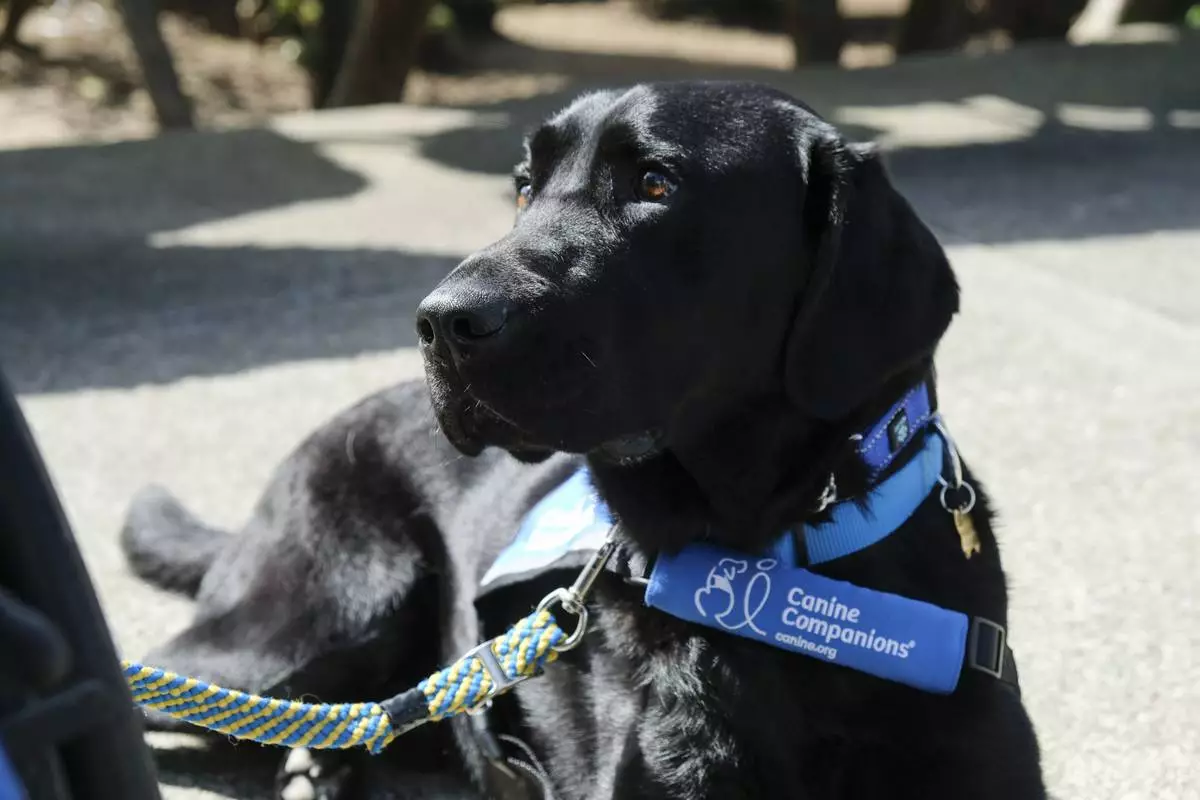
Artemis, a service dog, is seen by the wheelchair of handler Benjamin Carter at the San Quentin Rehabilitation Center in San Quentin, Calif., Friday, March 28, 2025. (AP Photo/Eric Risberg)

Incarcerated men at the San Quentin Rehabilitation Center do a demonstration with the dogs they are raising during a celebration in San Quentin, Calif., Friday, March 28, 2025. (AP Photo/Eric Risberg)
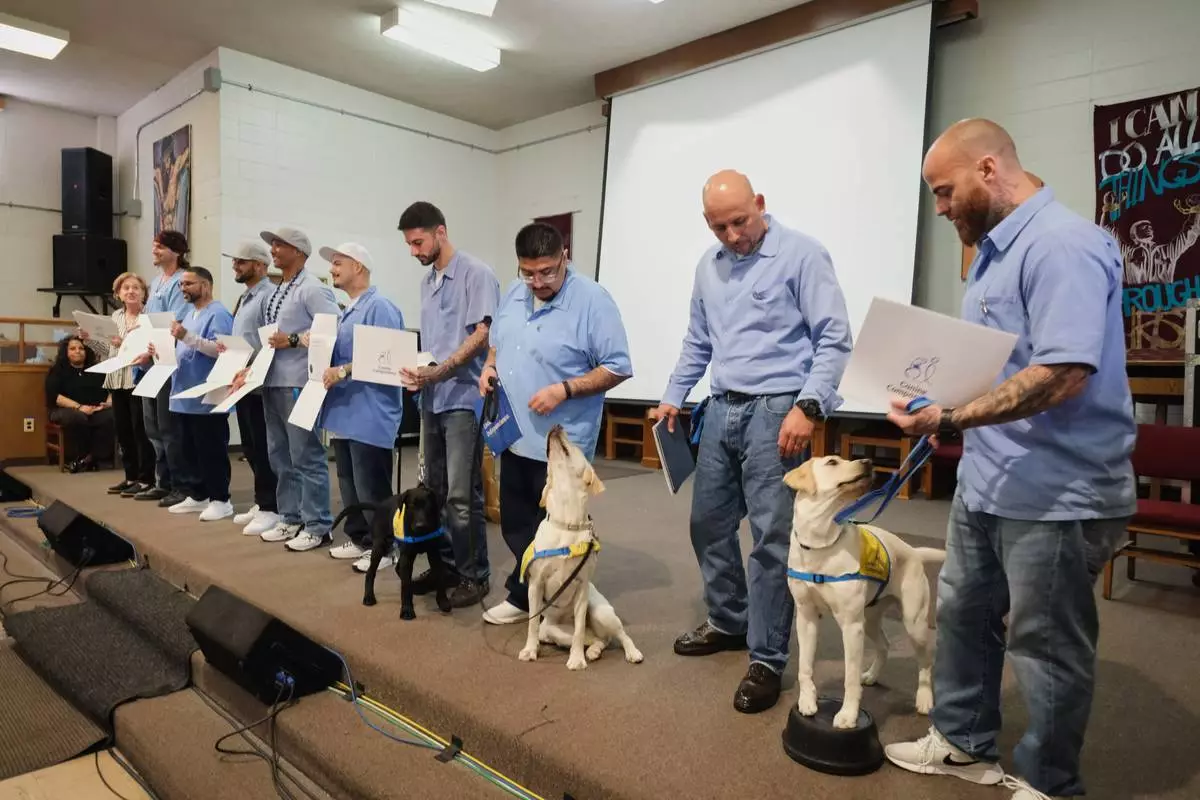
Jared Hansen, right, and other incarcerated men at the San Quentin Rehabilitation Center hold up their dog training certificates during a celebration in San Quentin, Calif., Friday, March 28, 2025. (AP Photo/Eric Risberg)
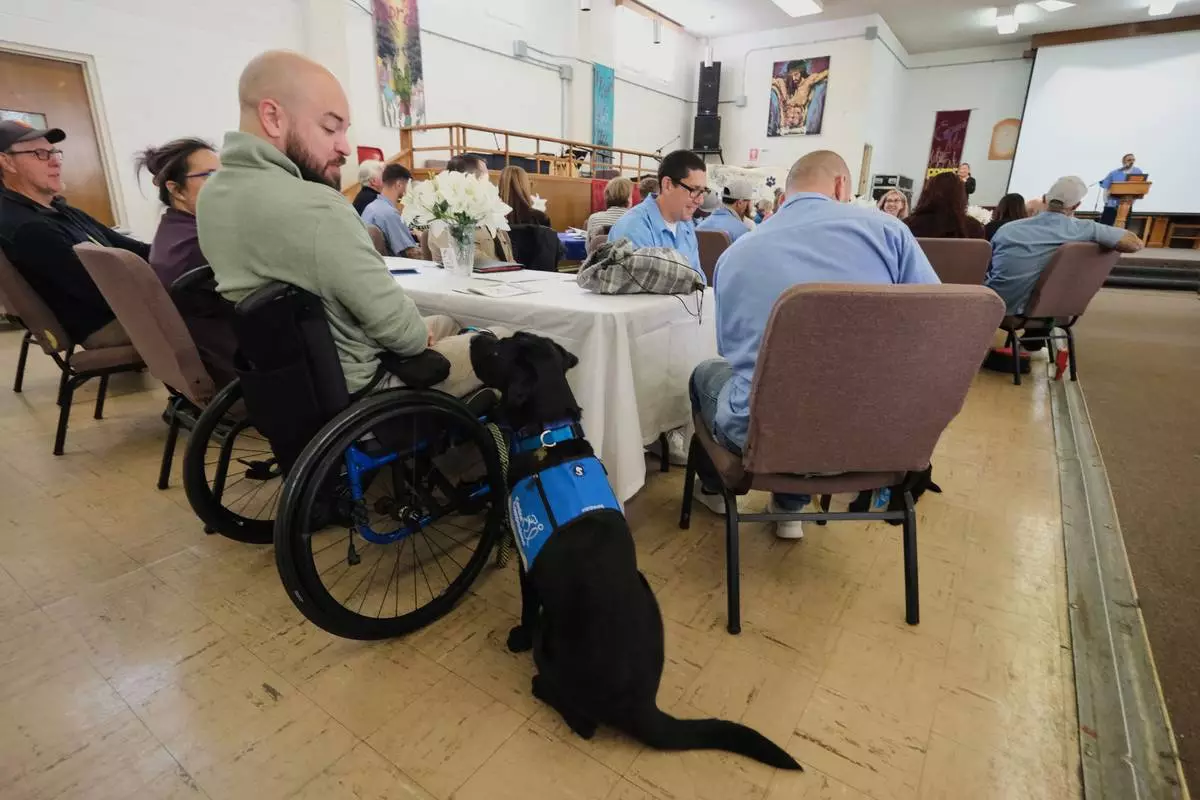
Handler Benjamin Carter looks at his service dog Artemis during a gathering at the San Quentin Rehabilitation Center in San Quentin, Calif., Friday, March 28, 2025. (AP Photo/Eric Risberg)
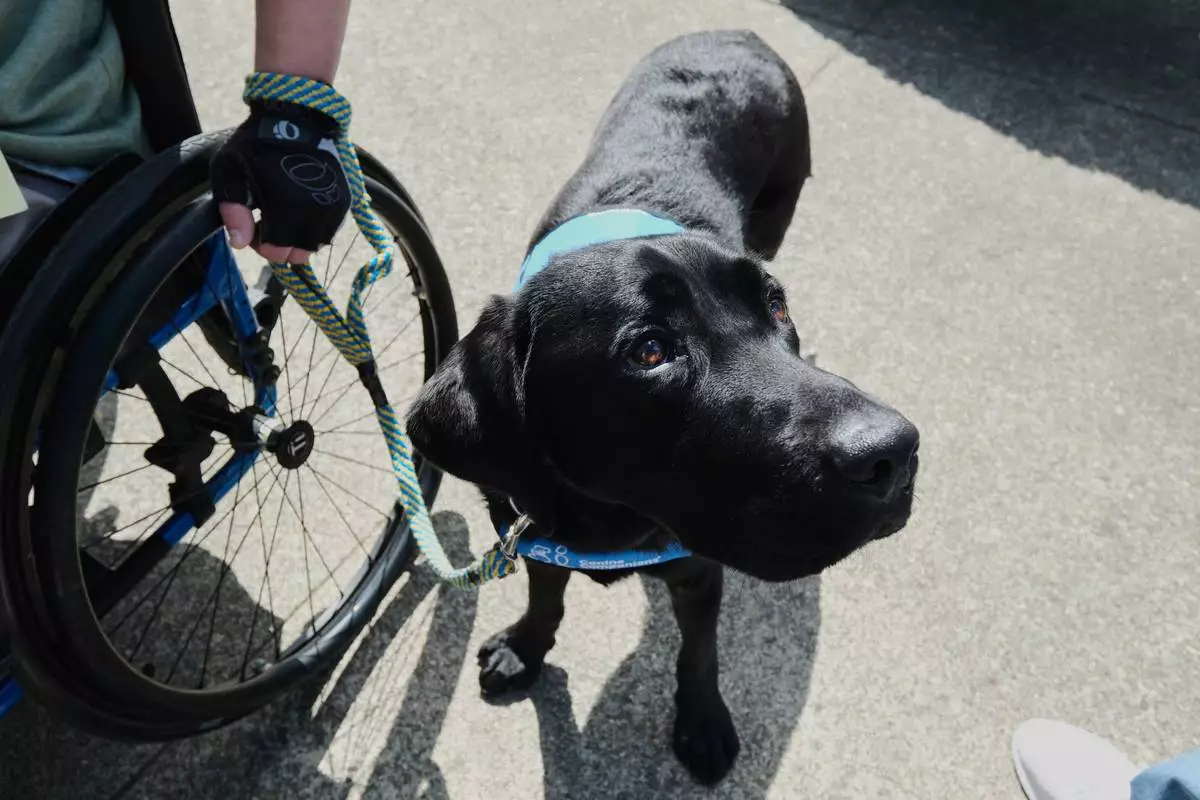
Artemis, a service dog, is seen by the wheelchair of handler Benjamin Carter at the San Quentin Rehabilitation Center in San Quentin, Calif., Friday, March 28, 2025. (AP Photo/Eric Risberg)
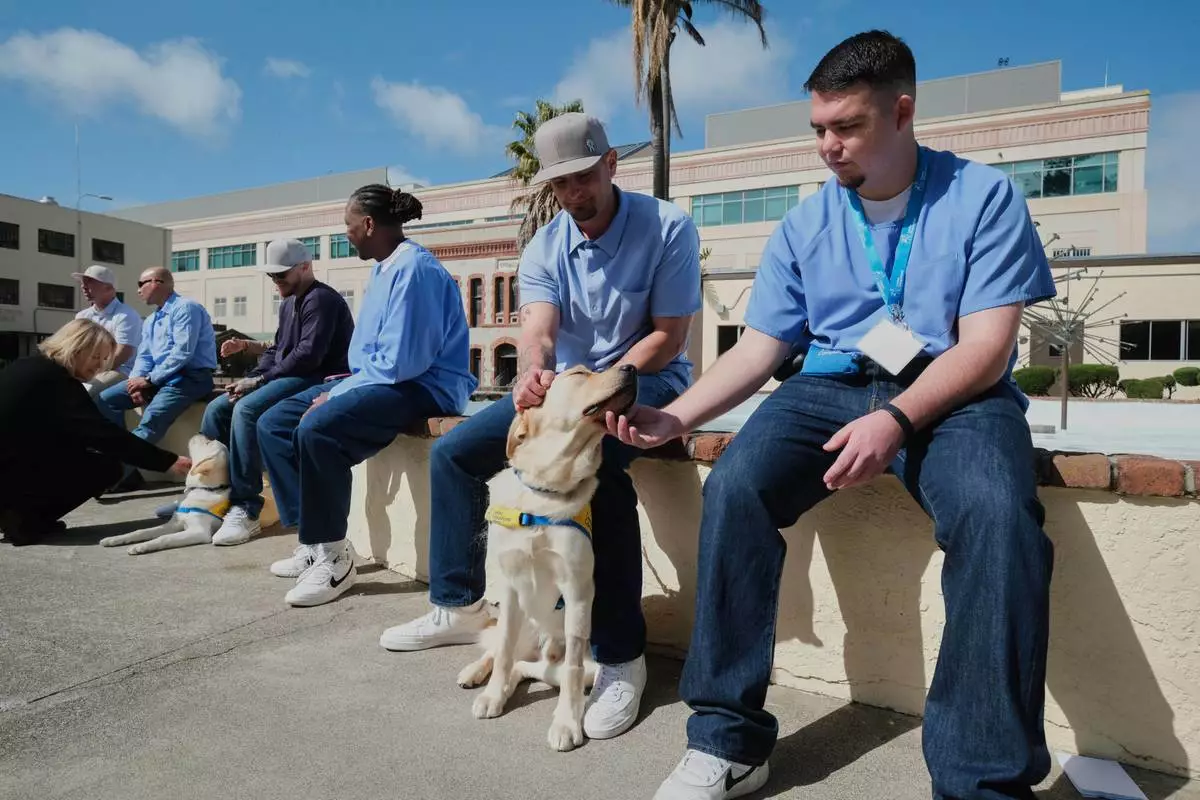
Incarcerated men at the San Quentin Rehabilitation Center pet a service dog in training at the prison in San Quentin, Calif., Friday, March 28, 2025. (AP Photo/Eric Risberg)
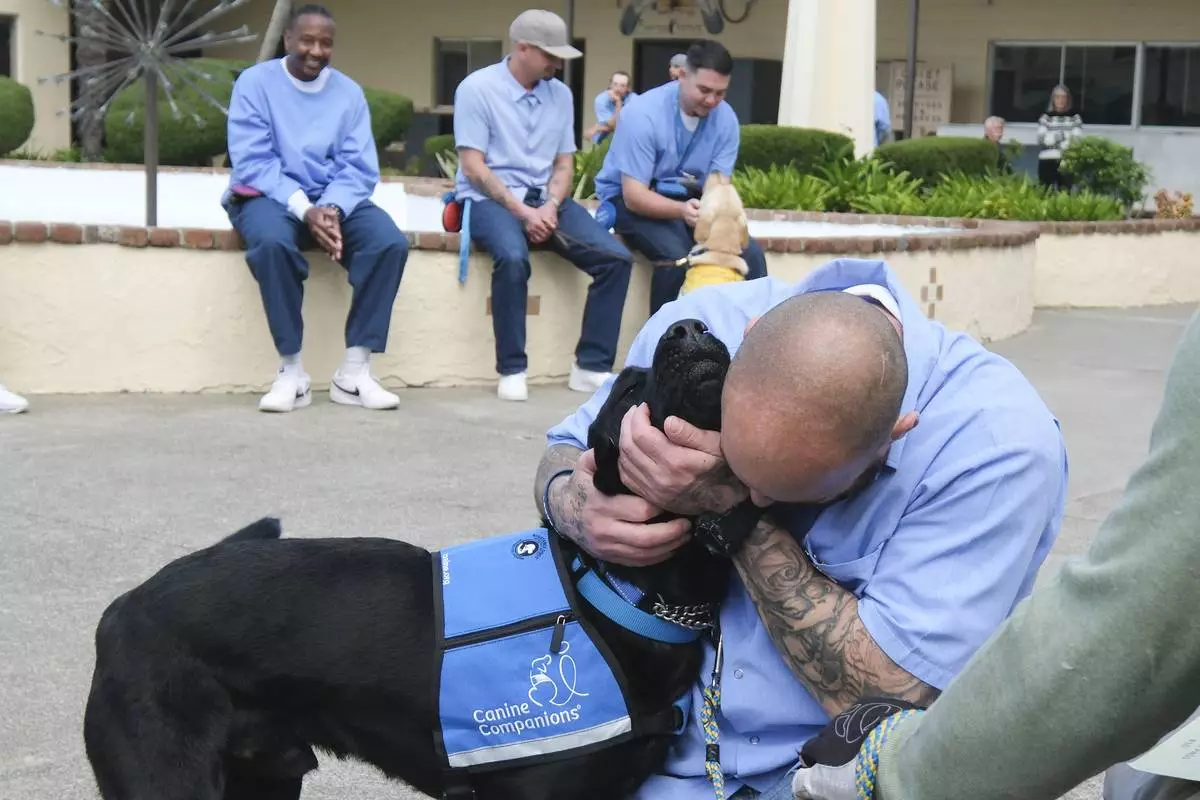
Jared Hansen, who is incarcerated at the San Quentin Rehabilitation Center, is greeted by Artemis, a service dog he helped train, in San Quentin, Calif., Friday, March 28, 2025. (AP Photo/Eric Risberg)
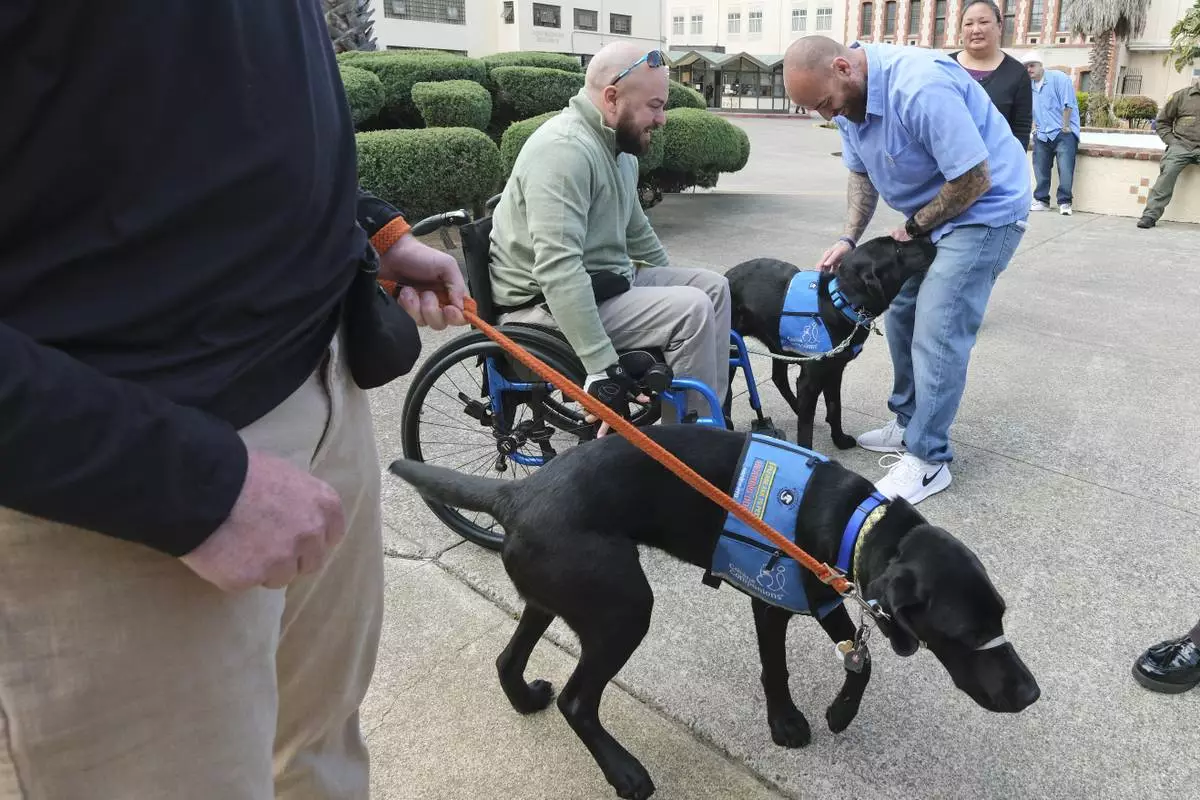
Jared Hansen, right, who is incarcerated at the San Quentin Rehabilitation Center, visits with Artemis as his handler, Benjamin Carter, looks on in San Quentin, Calif., Friday, March 28, 2025. (AP Photo/Eric Risberg)
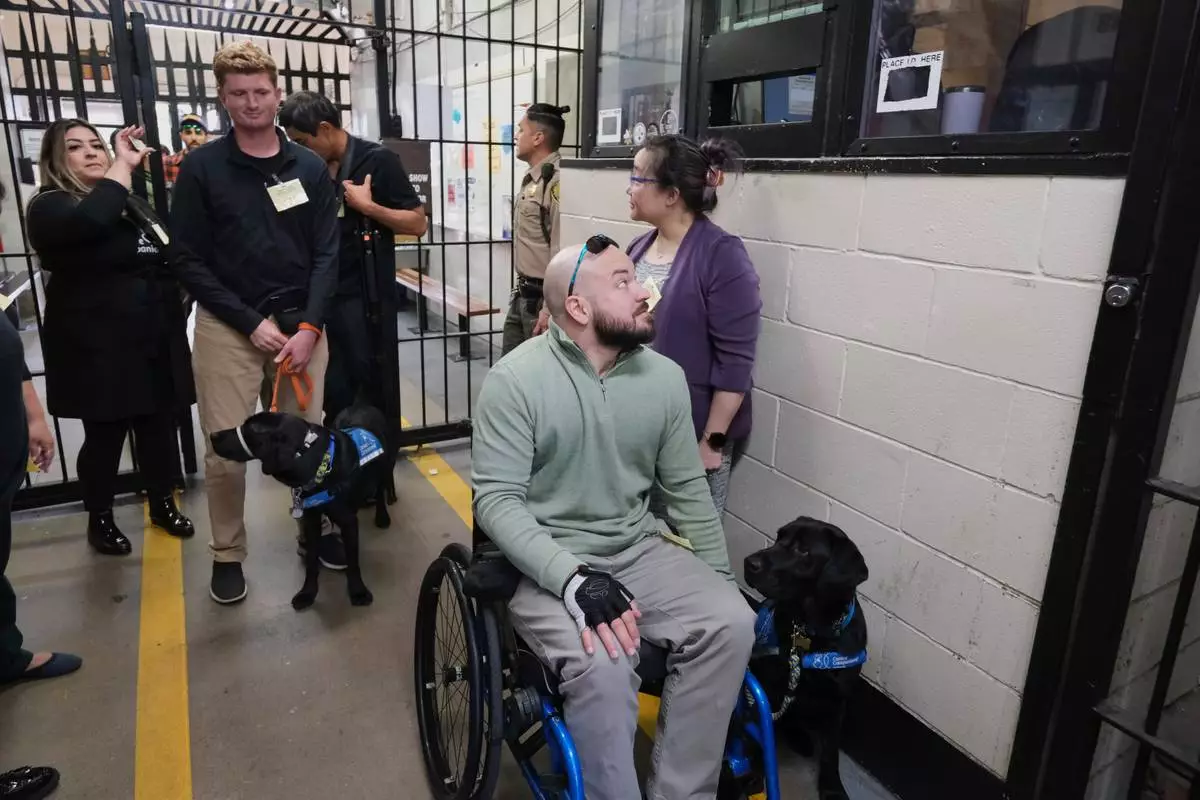
Benjamin Carter, in a wheelchair, with his service dog Artemis, and Robert Quigley, who is deaf, with his service dog Wendel, go through a secure entryway into the San Quentin Rehabilitation Center in San Quentin, Calif., Friday, March 28, 2025. (AP Photo/Eric Risberg)
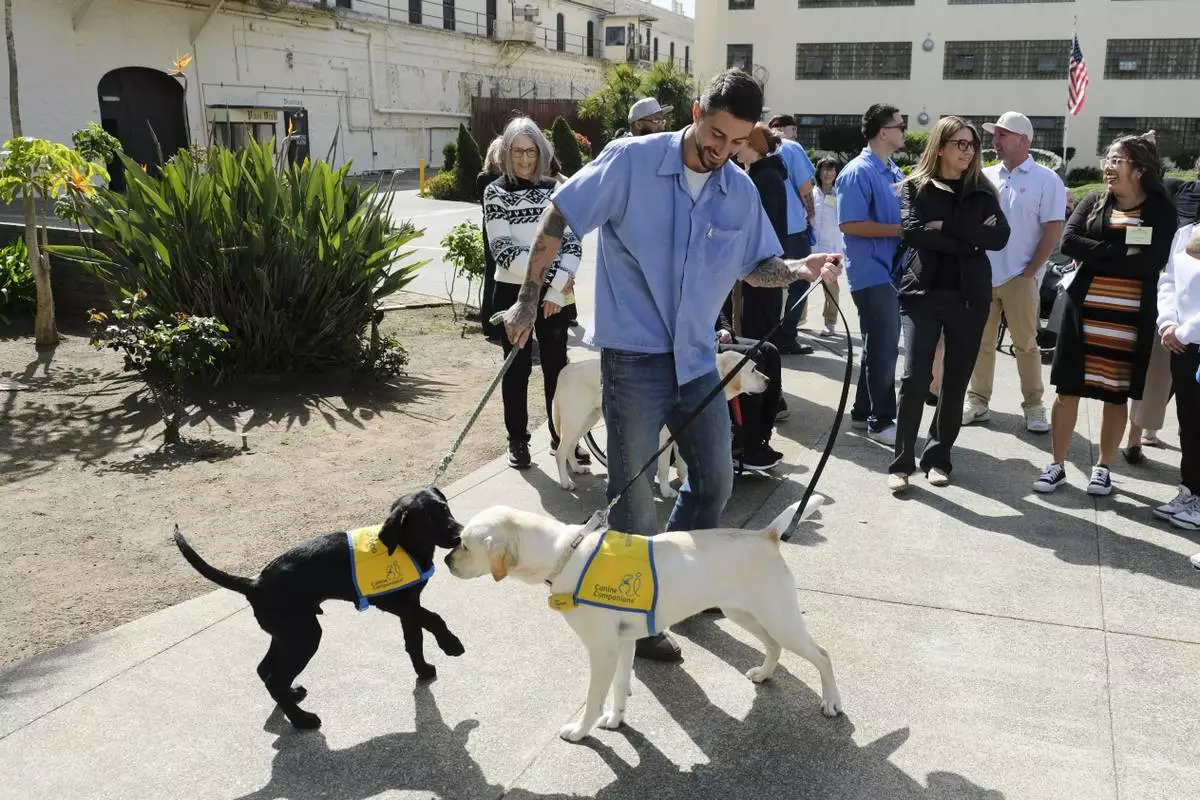
Chase Benoit, who is incarcerated at the San Quentin Rehabilitation Center, holds a pair of service dogs in training in San Quentin, Calif., Friday, March 28, 2025. (AP Photo/Eric Risberg)





























































